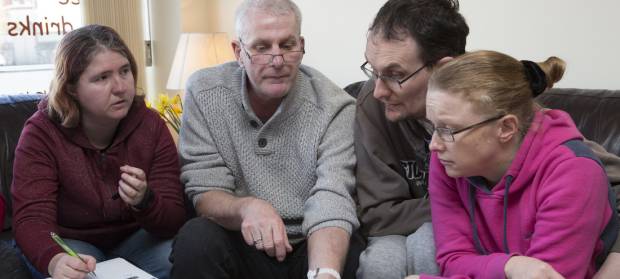Why is a Lasting Power of Attorney so important?
The
Mental Capacity
 Mental capacity means being able to make a decision when it needs to be made.
Act 2005 aims to empower people to make their own decisions, if needed with support.
Mental capacity means being able to make a decision when it needs to be made.
Act 2005 aims to empower people to make their own decisions, if needed with support.
It means that regardless of a person’s diagnosis, they should not be prevented from making their own decisions, if they are able. A person’s capacity to make a decision will vary depending on the decision which they want to make. The more complex a decision, the more information a person needs to understand, retain, use and weigh to arrive at, and communicate their decision. For example, a person may have capacity to
consent
 Consent is when you say yes to something, like an operation, or Mencap using your photo for a story. You may have to sign something to say yes. If you can't make your own decisions, someone else can say yes or no for you. They must think about what is right for you.
to a vaccination, but not have capacity to consent to a complicated and high risk operation.
Consent is when you say yes to something, like an operation, or Mencap using your photo for a story. You may have to sign something to say yes. If you can't make your own decisions, someone else can say yes or no for you. They must think about what is right for you.
to a vaccination, but not have capacity to consent to a complicated and high risk operation.
A Lasting Power of Attorney (LPA) is one form of supported decision making, where an adult can give a person they trust the power to make a decision on their behalf, if there is a time they lack capacity to make the decision.
There are 2 types of LPAs:
- property and financial affairs
- health and welfare
If a person lacks mental capacity to manage their
finances
 Finances are anything to do with money.
(where they have more than welfare benefits), and they do not have an LPA, then an application must be made to the Court of Protection for a financial deputy to be appointed. The deputy can make decisions on the person’s behalf.
Finances are anything to do with money.
(where they have more than welfare benefits), and they do not have an LPA, then an application must be made to the Court of Protection for a financial deputy to be appointed. The deputy can make decisions on the person’s behalf.
Although the Court can appoint a personal welfare deputy to make health and welfare decisions, in practice this is not common. This is because the
law
 Laws are the rules that everyone in the country has to follow. If you don't follow the rules you can get in trouble with the police.
allows others to carry out care and treatment on behalf of a person who lacks capacity to consent, if they believe it is in the person’s best interests. The Court should only appoint a personal welfare deputy if there is no other least restrictive option, and it is in the person’s best interests.
Laws are the rules that everyone in the country has to follow. If you don't follow the rules you can get in trouble with the police.
allows others to carry out care and treatment on behalf of a person who lacks capacity to consent, if they believe it is in the person’s best interests. The Court should only appoint a personal welfare deputy if there is no other least restrictive option, and it is in the person’s best interests.
A health and welfare LPA gives the attorney status when health or social services are considering possible care and treatment plans, and gives the attorney authority to decide where the person lives, with whom they are in contact, and their medical or dental treatment. It can extend to giving or refusing consent to life saving treatment.
Obstacles to making a Lasting Power of Attorney
The reality for many people with learning disabilities or
Autism
 Autism is a disability. Autistic people find it difficult to understand what other people think and feel. They also find it difficult to tell people what they think and feel. Everyone with autism is different.
, is that they are prevented from making an LPA: not because they lack capacity but due to the format of the lasting power, which runs to 20 pages and has additional continuation sheets. It is not possible to change the form, as the law requires that it must be in a set format.
Autism is a disability. Autistic people find it difficult to understand what other people think and feel. They also find it difficult to tell people what they think and feel. Everyone with autism is different.
, is that they are prevented from making an LPA: not because they lack capacity but due to the format of the lasting power, which runs to 20 pages and has additional continuation sheets. It is not possible to change the form, as the law requires that it must be in a set format.
The LPA refers to the Mental Capacity Act’s Code of Practice, which comprises of 295 pages- not all of which is relevant to the person making an LPA. In addition, the Office of the Public Guardian (OPG) has published supporting
guidance
 Guidance means being given clear instructions to be able to do something well.
which runs to 48 pages.
Guidance means being given clear instructions to be able to do something well.
which runs to 48 pages.
The LPA is hard to navigate, with terminology which will be unfamiliar to most people.
The person making the LPA must make lots of choices, beyond who they want as their attorneys and how they are to act. For example, choosing an independent person (known as ‘the certificate provider’), who will confirm that the person understands what they are doing; whether to give the attorney authority to give or refuse consent to life saving treatment; and whether to tell anyone that they have made the power.
On top of this, the power requires other people to be involved, including attorneys, witnesses, and the certificate provider, all completing their roles in line with very detailed Regulations, with a high chance of getting it wrong and the LPA not being valid.
The person must have capacity to make the LPA
The Act requires that the person making the LPA has mental capacity and is not acting under the undue pressure of another, and provides the necessary balance between empowerment and protection against abuse.
It would be wrong to automatically assume that an adult with learning disabilities or Autism does not have capacity to make a power. For many, with the right support and the right tools, it is entirely possible.
LPA Easy Read Packs
There are specialists who write
Easy Read
 Easy Read is a way of making written information easier to understand. Pictures are usually added next to the writing.
guides, but they are not cheap, meaning that the only way in which a suitable guide could be written, was to do it without charge, and with the assistance of the Mencap Trust Company who provided pictures, feedback and found willing volunteers to be part of a users’ workshop.
Easy Read is a way of making written information easier to understand. Pictures are usually added next to the writing.
guides, but they are not cheap, meaning that the only way in which a suitable guide could be written, was to do it without charge, and with the assistance of the Mencap Trust Company who provided pictures, feedback and found willing volunteers to be part of a users’ workshop.
The Supporter’s Guide
The person making the LPA will need the support and involvement of a trusted supporter. The supporter is likely to be an
advocate
 An advocate is a person who can help you have your say. An advocate can speak up for you if you find it hard.
or a trusted family member, but could be a solicitor.
An advocate is a person who can help you have your say. An advocate can speak up for you if you find it hard.
or a trusted family member, but could be a solicitor.
They will assist the person in understanding the choices to be made; taking instructions and drafting the power; organising witnesses and the certificate provider; facilitating with the signing and registration of the power. This requires a significant time commitment, as the person making the LPA will need time and space to understand new terms, consider choices and express what they want. It is also necessary to reduce the risk of undue pressure being exerted on them to make the power.
Guidance for the Certificate Provider and Attorneys
The OPG does not have any published guidance for Certificate Providers. The law sets out who can and who cannot take on this role. The required capacity to make an LPA is set out in law. As there may be at risk of a challenge, that the person did not fully understand what they were signing, guidance for the certificate provider is an important safeguard, and provides reassurance for anyone taking on the role.
The LPA requires that a specific part of the form must be read by, or read to the person before they sign, and they must confirm the choices they have made. This has been converted into an Easy Read format.
As a health and welfare LPA can only be used by an attorney, when the person cannot make a particular health and welfare decision, the attorney needs upfront guidance about the role they will be taking on. It is important to ensure that the attorney does not assume control of decisions, and recognises the need to continue to support the person to make those decisions they can. Guidance ensures the correct balance between empowerment and protection is maintained.
A bit about Caroline Bielanska
I am a solicitor, independent consultant and a mediator. I specialise in mental capacity, health and social care law.
I have written lots of legal books, including Cretney & Lush on Lasting and Enduring Powers of Attorney (Published by Lexis Nexis), and sit on various committees, including the Law Society’s Mental Health & Disability Committee.
Communication connects us- whether it’s spoken, written, visual or non-verbal, and yet solicitors, doctors and social workers often communicate in what can seem like a foreign language, using different terms, with lots of acronyms. Lots of people have communication difficulties- such as English not being their first language or having dyslexia
Dyslexia is a learning difficulty. People who have dyslexia can find it hard to read, write and spell. , and there are lots of tools to help. But for people who have an intellectual difficulty, they can be denied access to the law, because professionals do not have the right tools.
I have long considered writing an Easy Read guide for making a Lasting Power of Attorney, but I knew it would be very time consuming because it is a complex area of law. Lockdown 1.0 in March 2020, meant that suddenly I had an extended period of free time. I was very pleased that the Mencap Trust Company were interested in working with me in its development, and grateful to one of their Trustees and a good friend of mine, Julia Abrey for motivating me to do it.
A bit about Julia Abrey:
When I became a director of Mencap Trust Company (MTC) in 2019 I naturally wanted to get involved in all our trusts and find out about our beneficiaries. It was immediately clear to me that the service which MTC provides- and in particular the support its relationship managers provided to beneficiaries, their carers and families - was amazing. MTC's team go above and beyond to help our beneficiaries have the best life possible - and make their own decisions with support. I had been thinking for a while about the same issues which concerned Caroline around how to deal with the obstacles to making a Lasting Power of Attorney- a powerful document which can be a vital tool when important decisions about health and welfare matters need to be made- and of great benefit and use to our beneficiaries and their families. But how to explain a 20 page document and another 350 pages of guidance in a clear and straightforward way? I've been lucky enough, as a lawyer working for many years in the field of mental capacity, to have Caroline Bielanska as a colleague on various bodies - and as a friend. She was the ideal person to discuss this project with - and when we found that we have both been thinking about the same thing - and with the involvement of the wonderful team at MTC and Mencap - we were on our way!
It's been a pleasure to have an involvement with this wonderful project and I hope that all who use the LPA Pack and guides find them of the great use - which LPAs can be.
A bit about Stacy East:
As one of the relationship managers, I visit our beneficiaries, their families and supporters to do review visits. Some of the beneficiary’s we visit could really benefit from having LPA, and it is one of the questions we ask at a review. Sometimes people are put off by the process of applying for LPA, and so when Julia and Caroline told me about their ideas of writing an easy read guide for people with a learning disability
A learning disability is to do with the way someone's brain works. It makes it harder for someone to learn, understand or do things. and their carers, I really wanted to get involved. I am a trained person centred planning facilitator and I have completed training in easy read. I have worked with people with a learning disability and autism for more than 16 years, and my experience of working in support services really helped me to consider how a carer may use the guides.
I love to get creative when presenting information to other people. This project was a great challenge and I am so privileged to have been part of it. I really hope the guides help people with a learning disability to apply for LPA, because it is such an important tool that enables people with a learning disability to be at the centre of all decisions made.
These resources are presented free of charge, however if you have found them helpful, please consider making a donation to Mencap
Easy Read Guides
Easy Read Supporters Guide on health and welfare LPA
Easy Read Guide and Record to health & welfare LPA
Easy Read Guide to SECTIONS 8 and 9 of health and welfare LPA
Supporters Guide on property and financial affairs LPA
Easy Read Guide and Record on property and financial affairs LPA
Easy Read Guide and Record on property and financial affairs LPA
Easy Read Guide to SECTION 8 of property and financial affairs LPA
Easy Read Guide to SECTION 8 of property and financial affairs LPA
Certificate provider's guidance for property and financial affairs LPA
Certificate provider's guidance for property and financial affairs LPA
Guidance for a property and financial affairs attorney

